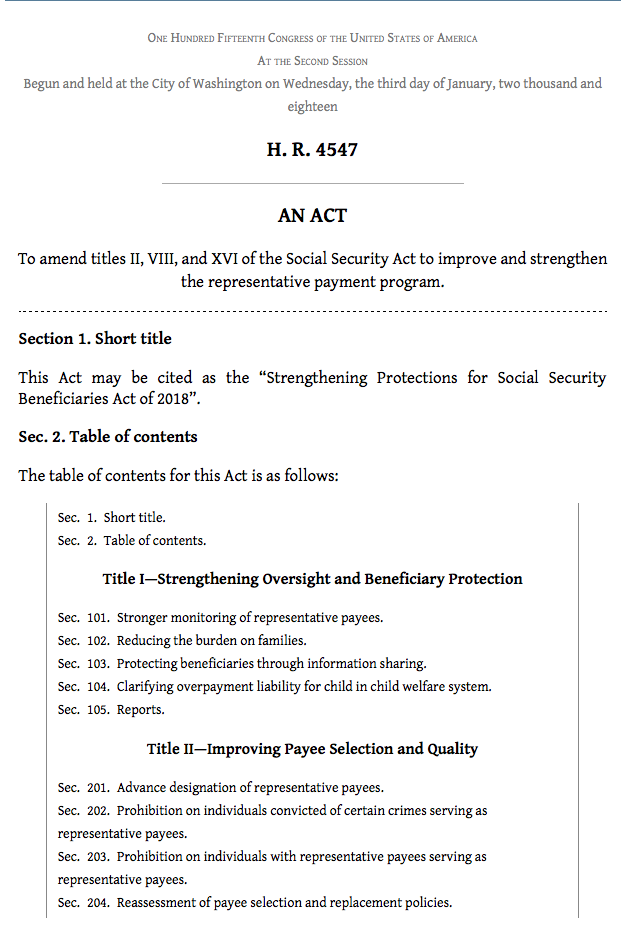Last Friday, President Trump signed a bill unanimously approved by Congress to increase oversight and improve an important Social Security program for disabled or special needs beneficiaries.
H.R. 4547, known as the Strengthening Protections for Social Security Beneficiaries Act, focuses on increasing protections for those relying on representative payees to manage their Social Security income.
A representative payee is an individual or organization authorized by the Social Security Administration to act on behalf of a beneficiary to receive benefits and manage his finances. Representative payees are established when a beneficiary’s physical or mental health severely limits his ability to manage his own benefits.
Representative payees’ primary responsibility is to use benefit payments to meet all of a beneficiary’s needs: paying bills, purchasing groceries, putting money into savings, and making sure he’s getting proper medical treatment.
The SSA also requires a representative payee to keep extensive records on how Social Security funds were used, provide the SSA with accounting reports, and make sure medical professionals, social service agencies, and the SSA have up-to-date information regarding a beneficiary’s Social Security eligibility and benefits.
Though a representative payee doesn’t have the authority of a legal guardian (for example, a representative payee can’t sign legal documents or control a beneficiary’s earned income apart from Social Security), the role is similar in the sense that a representative payee has an extraordinary level of access to a beneficiary’s income and a great deal of control over how he uses that income.
And according to lawmakers, that’s where problems can arise.
In the same way legal guardians can fall far short of what their duties require, Congress feels representative payees aren’t being screened they way they should, resulting in neglect and exploitation.
H.R. 4547, introduced by Sam Johnson (R-TX) and John Larson (D-CT), is a bipartisan collaborative effort to modernize the representative payee system with an eye toward ensuring the best possible candidates assume the role of payee for beneficiaries in need.

With the adoption of H.R. 4547, those serving as representative payees will see an increased number of performance reviews, including additional reviews, and increased scrutiny on their effectiveness all around.
The candidates themselves will also face stricter requirements before being approved as representative payee in the first place. The law will more strictly codify and enforce rules preventing those with certain criminal convictions from becoming payee.
At the same time, H.R. 4547 hands more decision-making power to beneficiaries themselves–now, beneficiaries can make their own list of payee candidates by order-of-preference to help the SSA select the best fit for the job from trusted friends and family members.
It has been 14 years since Congress made moves to modernize the representative payee system millions of vulnerable Americans rely on, but sponsor Rep. Sam Johnson believes we’re finally making a step in the right direction:
“This new law is great news for the millions of Social Security beneficiaries who rely on a representative payee to help them manage their benefits. Not only will it provide much-needed accountability for the representative payee program, but it also puts measures into place that ensure newly selected representative payees are qualified and trustworthy. …This important legislation…will ensure Americans–from children, seniors, to individuals with disabilities – will have more peace of mind when it comes to having a representative payee they can trust.”
And as Rep. John Larson notes, it marks an important partnership between legislators of both parties to ensure the protection of Social Security beneficiaries:
“This bipartisan bill, now law, strengthens the selection and monitoring of representative payees and reduces some of the administrative burdens that families face when caring for loved ones.”



